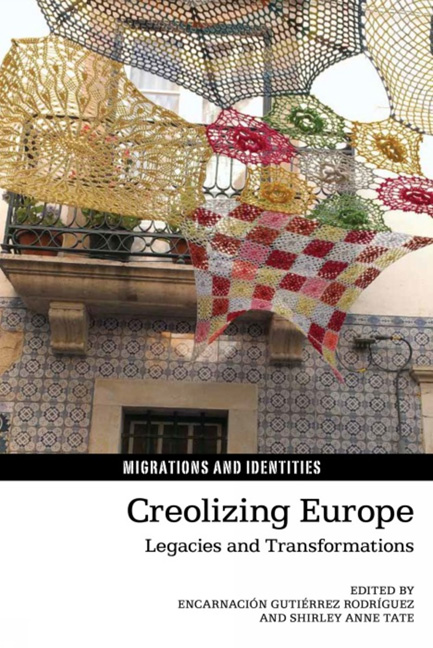Book contents
- Frontmatter
- Dedication
- Acknowledgements
- Contents
- List of Figures
- List of Contributors
- Introduction: Creolizing Europe: Legacies and Transformations
- 1 Creolité and the Process of Creolization
- 2 World Systems and the Creole, Rethought
- 3 Creolization and Resistance
- 4 Continental Creolization: French Exclusion through a Glissantian Prism
- 5 Archipelago Europe: On Creolizing Conviviality
- 6 Are We All Creoles? ‘Sable-Saffron’ Venus, Rachel Christie and Aesthetic Creolization
- 7 Re-imagining Manchester as a Queer and Haptic Brown Atlantic Space
- 8 Queering Diaspora Space, Creolizing Counter-Publics: On British South Asian Gay and Bisexual Men's Negotiations of Sexuality, Intimacy and Marriage
- 9 On Being Portuguese: Luso-tropicalism, Migrations and the Politics of Citizenship
- 10 Comics, Dolls and the Disavowal of Racism: Learning from Mexican Mestizaje
- 11 Creolizing Citizenship? Migrant Women from Turkey as Subjects of Agency
- Index
10 - Comics, Dolls and the Disavowal of Racism: Learning from Mexican Mestizaje
- Frontmatter
- Dedication
- Acknowledgements
- Contents
- List of Figures
- List of Contributors
- Introduction: Creolizing Europe: Legacies and Transformations
- 1 Creolité and the Process of Creolization
- 2 World Systems and the Creole, Rethought
- 3 Creolization and Resistance
- 4 Continental Creolization: French Exclusion through a Glissantian Prism
- 5 Archipelago Europe: On Creolizing Conviviality
- 6 Are We All Creoles? ‘Sable-Saffron’ Venus, Rachel Christie and Aesthetic Creolization
- 7 Re-imagining Manchester as a Queer and Haptic Brown Atlantic Space
- 8 Queering Diaspora Space, Creolizing Counter-Publics: On British South Asian Gay and Bisexual Men's Negotiations of Sexuality, Intimacy and Marriage
- 9 On Being Portuguese: Luso-tropicalism, Migrations and the Politics of Citizenship
- 10 Comics, Dolls and the Disavowal of Racism: Learning from Mexican Mestizaje
- 11 Creolizing Citizenship? Migrant Women from Turkey as Subjects of Agency
- Index
Summary
Introduction
‘Mestizaje’ and ‘creolization’ are parallel and competing terms. Both refer to processes and discourses of mixture, racial and cultural, emanating from colonial encounters in the Americas. Moreover, mestizaje also refers to nineteenth- and twentieth-century political projects with varying degrees of institutionalization. Mestizaje is an ambitious idea that aims to represent the inauguration of modernity to which the contact between Europe, America, Asia and Africa gave precedent. It is, simultaneously, a living and shifting process of racial miscegenation, cultural transformation and nation-building. Mestizaje has moved beyond the realm of linguistics, culture and identity of creolization, to include a top-down official political dimension that has rewritten national histories in order to cohere nation states in Latin America.
The focus of this chapter is not to make yet another rhetorical comparison of the differences or similarities of each term and propose either a new term or emphasize the benefits or disadvantages of creolization against mestizaje or vice versa (Kraidy, 2005; Cohen and Toninato, 2010; Baron and Cara, 2011; Lionnet and Shi, 2011). While we favor mestizaje as it speaks to the Latin American context and at least parts of the Caribbean experience, we want to concentrate on the consequences of official processes of institutionalization of mixture and offer this analysis to the propagators of a political project of European creolization.
However, there are four assumptions around both terms that are worth clarifying. First, we are particularly interested in exposing Europe to the Mexican experience of mestizaje as in both contexts we are dealing with local practices, identities and histories constantly encountering migrating peoples from all over the globe. This is because, on the one hand, creolization can be limiting. Creolization focuses on African and European presences on Caribbean soil creating a distinctive colonial and postcolonial ‘third space’ (Hall, 2010). It presupposes a land empty of the Indigenous population and does not include a history of Asian indentureship. Both these latter groups figure far less in Anglophone and Francophone theorizations of creolization than the master European and African signifiers. On the other hand, historically, mestizaje concerns the interaction between Europeans and Africans with the local Amerindian peoples (in a simultaneous Iberian dialogue with Asia, see Gruzinski 2002; 2010).
- Type
- Chapter
- Information
- Creolizing EuropeLegacies and Transformations, pp. 175 - 201Publisher: Liverpool University PressPrint publication year: 2015



